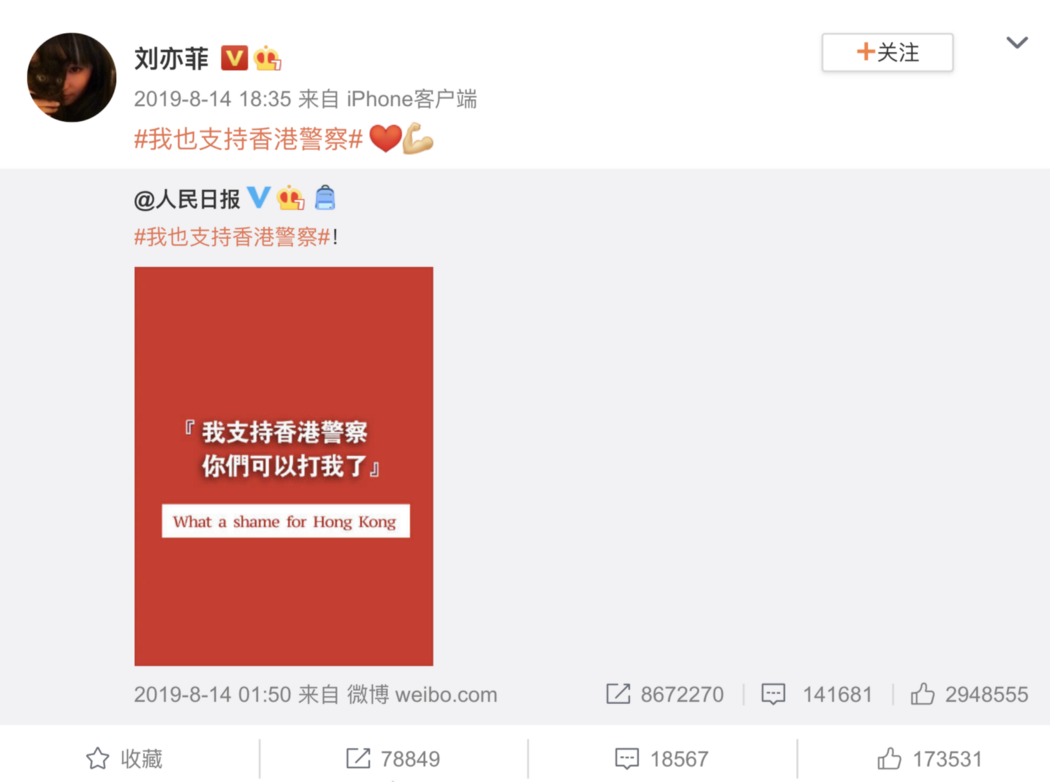Renewed furore arose after Mulan’s release on Disney Plus, on 4 September. A week later, the hashtag #boycottmulan is still trending on Twitter, and the phrase is the first thing that pops up when #boycott is googled.
Here’s all you need to know about the controversy.
The story
It centres around two politically sensitive Chinese issues — the clash between pro-democracy protesters and police forces during the Hong Kong riots, and the treatment of Uyghur Muslims in Xinjiang, China.
The former came into the spotlight when the movie’s lead actress, Liu Yifei, re-tweeted a post on Weibo, a popular Chinese social media platform last year. It read: “I support Hong Kong’s police, you can beat me up now”. She then added the hashtag, #我也支持香港警察, which roughly translates to “I also support the Hong Kong police”.

Back in summer 2019, it coincided with the eruption of protests over a bill that would have allowed for Hong Kong citizens to be extradited to Mainland China, according to The BBC. Amid an already combustible situation that had divided the world into police versus protesters, the action drew ire and swift condemnation by online dissidents, as it was seen as support for police brutality.
Fast-forward a year later, past the virus that decimated the movie industry and delayed the release of the live-adaptation movie, to the second issue of contention. As Hong Kong activist, Joshua Wong, continued to lead the charge to boycott the movie, tweeting, “This film is released today. But because Disney kowtows to Beijing, and because Liu Yifei openly and proudly endorses police brutality in Hong Kong, I urge everyone who believes in human rights to #BoycottMulan.”, viewers noticed something else that put the film under international fire.
In the ending credits of the movie, special thanks to the ‘Publicity Department of CPC Xinjiang Uyghur Autonomous Region Committee’ and the ‘Bureau of Public Security in Turpan’ was given, which spurred criticism that the filmmakers had chosen to shoot in an area identified with human rights abuses. In Xinjiang, more than a million Uyghurs — a predominantly Muslim, Turkic ethnic group — have been reported to be detained in “re-education camps”, with leaked documents alleging enforced sterilisations, mass labour, and indoctrination.
As a result, the movie has again come under public scrutiny, and calls to boycott the movie have intensified. According to CNET, some have tweeted that support for Mulan is tantamount to being complicit in human rights violations, and individuals with influence, like novelist Jeannette Ng, have joined the call for boycott and censure.
The larger story
Not all are jumping on the ‘cancel Mulan’ bandwagon, and some publications have provided additional context on the background political climate to consider.
Pieces by Time and Medium suggested the incident with Liu Yifei is part of a larger trend where support among Chinese entertainers for the government is the norm. As Medium argues, “he can cancel her life way faster than you can cancel her movie”. Time further corroborates this, reporting that “most Chinese entertainers have either voiced support for the government or refused to comment either way on the protests”. Lay Zhang Yi Xing, a member of K-pop group Exo, and Jackie Chan were cited as two of such other celebrities, but they’d been subjected to much less fanfare.
The New York Times also explains the diplomatic game Disney is forced to play in the name of business, regarding the ongoing saga once the credits rolled. It was a major oversight for a minute of background footage in the 1-hour-55-minute film, but apologising for the Xinjiang credits now could anger China and get them shut down for future releases (remember China’s feud with NBA?). As politics continue to taint almost all aspects of life, it seems Disney is but another in a line of companies ensnared in the political quagmire between America and China.
The effect on the box office
While the boycott trended on social media, according to Deadline, its initial debut in a handful of countries still went strong. Mulan brought in $5.9 million in revenue over the past weekend alone, after opening in Croatia, Czech Republic, the Middle East, Slovakia, Turkey, Malaysia, Singapore, Taiwan and Thailand. In Singapore, Malaysia, and Thailand, the movie trended at number one, and The Straits Times reported that Mulan received the “highest opening weekend take of any film so far this year”.
In China, the main market the film has been targeted at, Mulan leads this opening weekend, albeit to smaller numbers than expected ($8.26 million on day one). An exclusive report by Reuters suggests why — it could have been a ripple effect from China’s decision to ban media coverage of the movie, right before its release. It seems the #boycottmulan movement might have contributed to this, as sources speculate the order was due to the negative publicity from the film’s links with the Xinjiang region.
The conclusion
In China, the political fallout does not seem to have put people off, more than the movie’s lacklustre reviews (4.9 on China’s Douban; 75% on Rotten Tomatoes) and widespread piracy issues. According to Al Jazeera’s feature, Shanghai cinema-goer Gao Wen Xing summarises, “We should not make art political”.
It begs the question: Would the controversy have caught on as much if the movie had been lauded in reviews?












